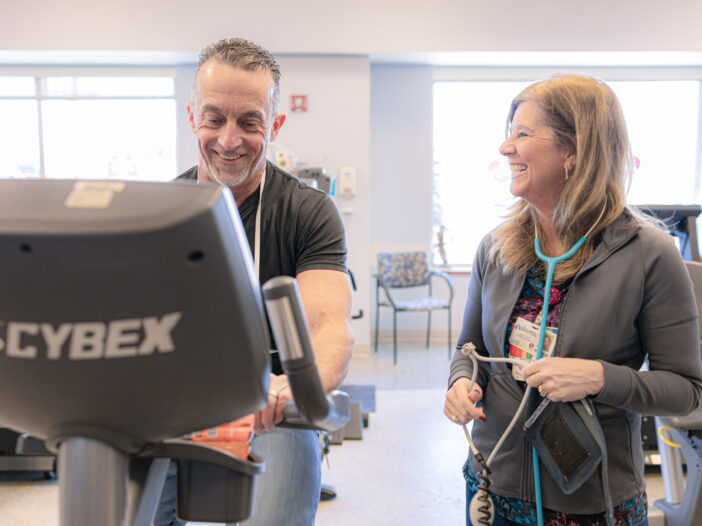
Orthopedic/Musculoskeletal Rehabilitation: Therapists use a range of treatment approaches to help regain function. Services include therapeutic exercise, manual therapy and customized home programming instruction for patients recovering from:
| Sprains and strains Tendonitis Bursitis | Amputation Arthritis Headache | Temporo-mandibular joint (TMJ) dysfunction |
Back and Spine Care: Physical therapists with specialized training will guide the patient’s active recovery and help them acquire skills for self-management of their spinal conditions:
- Manual skills for symptom relief
- Therapeutic exercise instruction addressing posture, range of motion, flexibility, strength and coordination issues
- Functional restoration and conditioning programming that assists to resume activities of daily living, work activities or recreation
- Creating a plan for life at home, to optimize recovery and prevent aggravation of the spine problem
Post Surgical Rehab – Continuing Rehab after Hospitalization: Our therapists provide outpatient rehab services to patients after hospital discharge. We support patients following:
| Total joint replacement Surgery for sports injuries Spine surgery | Trauma rehabilitation Hand/upper extremity surgery Reconstructive surgery |
CMTS therapists communicate closely with the patient’s surgeon to support an optimal outcome for the patient.
Balance and Vestibular Program: This program seeks to decrease dizziness and improve balance for those who feel unsteady or experience dizziness, positional vertigo, lightheadedness or spinning, or may have experienced a fall.
Work Injuries: CMTS therapists offer services to support the injured worker, which include:
- Acute injury treatment focused on active, timely recovery
- Ergonomic review/work risk analysis
- Education and training to prevent re-injury
- Work conditioning, restoring abilities to perform work
Hand and Upper Extremity Therapy: CMTS therapists support a comprehensive range of hand and upper extremity conditions including:
| Repetitive motion disorders Post fracture of hand, wrist/upper extremity Sports injury of hand, wrist/upper extremity Sprains and strains | Burns Trauma rehabilitation Hand/upper extremity surgery Reconstructive surgery |
Treatment services include:
| Splinting Pain management Joint protection Post surgical care Therapeutic exercise to regain range of motion and strength | Work simulation/job task analysis Scar management Desensitization Customized adaptive equipment to support activities of daily living |
Lymphedema Management: Lymphedema is the abnormal accumulation of lymphatic fluid under the surface of the skin, causing swelling in the limbs. We focus on:
| Controlling or reducing lymphedema symptoms Decreasing pain | Increasing independence in self-care Improving mobility Long term self-management |
Treatment consists of:
| Lymphatic massage Compression bandaging Exercise | Skin care training Compression garment fitting |
Pelvic Floor Rehab – Bladder Control–Incontinence Management: Physical therapists with specialized training provide treatment and training support to women, men and children:
| Urinary and fecal incontinence Urinary urgency Urinary frequency Constipation Overactive bladder | Pelvic pain: difficulty with sitting, pain with intercourse and pain of the hip, lower back and lower abdomen Pregnancy/postpartum incontinence/pain Pelvic organ prolapse |
Specific treatment and training is identified for the individual patient:
| Bowel and bladder training Biofeedback Soft tissue mobilization | Pelvic floor muscle training Planning and support for self-management at home |
Swallowing Therapy: Speech pathologists partner with primary care providers to assess swallowing functioning and develop a treatment plan:
- Exercises to improve muscle control and strength
- Compensatory strategy training to compensate for deficits
- Facial, oral and pharyngeal exercise in conjunction with electrical stimulation
- Neuromuscular electrical stimulation (VitalStim) to retrain swallow
- Patient training regarding diet consistency strategies to reduce health risks
- Food preparation instruction
The goal of swallow/dysphagia therapy is to reduce the risk of aspiration and improve swallowing function, allowing the patient to consume food and liquid in a variety of consistencies. Patients may benefit if they have experienced:
| Stroke Traumatic brain injury Head and neck cancer Neurological diseases | Respiratory diseases Facial paralysis Post polio syndrome |
Adult Speech/Language Therapy: Speech language pathologists evaluate and treat adult speech and language disorders, including:
Voice: Vocal changes, vocal cord dysfunction and difficulty with vocal quality and loudness. The goal of therapy is to increase optimal vocal pitch, appropriate loudness, resonance, optimizing breathing style, pacing for speech production and vocal hygiene programming.
Fluency: The goal is to decrease or eliminate fluency difficulties, excessive upper body/ laryngeal tension and provide fluency-enhancing strategies.
Dysarthria and Apraxia: The goal of therapy is to develop functional speech strategies and/or determine if speech-based therapy tools would improve communication, which may include technical augmentative communication devices or speech generating devices. Therapy supports communication skills for home, work and community environments.
Pediatric Speech/Language Therapy: Speech therapists work closely with parents, pediatricians and CDS to evaluate and treat all aspects of early communication skills, including comprehension of spoken language, verbal expression, pragmatics/social language skills, articulation/sound production skills, fluency and voice. The goal is to help children attain the communication skills required in education and social settings.
Osteoporosis Program: Therapists design safe exercise and activity programs to improve an individual’s strength, balance and overall function. A customized home program is designed to help decrease bone loss and lower the risk of falls or fractures.
Neurological Rehabilitation: Our team of physical therapists, occupational therapists and speech-language pathologists work closely with inpatient rehab facilities to support a smooth transition to the outpatient phase of care. Therapy is focused on supporting the patient’s continued effort to regain function:
| Brain injury Post-concussive syndrome Stroke Parkinson’s disease | Multiple sclerosis Spinal cord injury Other neurological conditions |
Rehab programming focuses on enhancing challenging areas of function:
| Self-care Mobility Cognition | Balance Communication Swallowing |
You may require a combination of multiple therapies to find relief and restore abilities. Your therapeutic care plan will outline what is needed and evolve to meet your changing needs.
